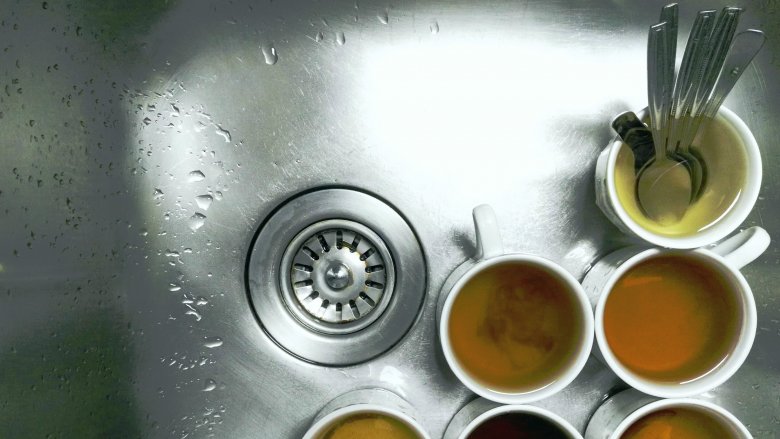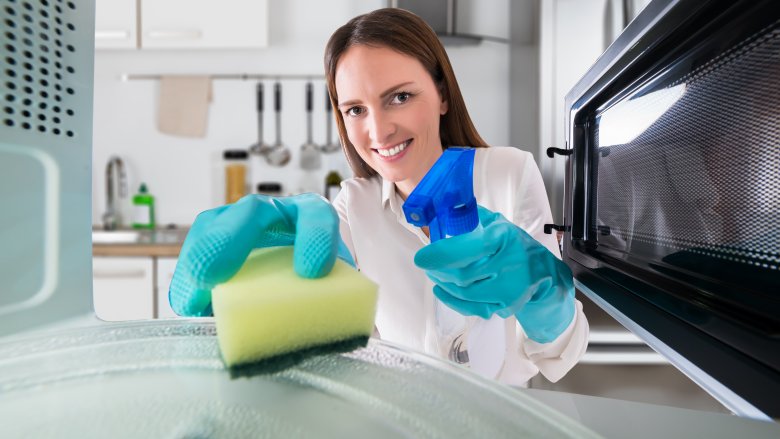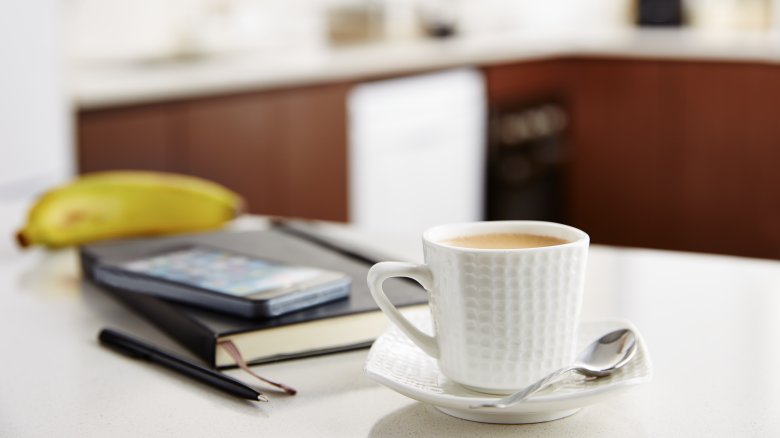The Surprising Case For Never Washing Your Coffee Cup
There's one in every office and in every family: the person that's bad at washing their coffee cup. You know the cup, the favorite mug that's so discolored it's hard to tell if there's coffee in it or not. Believe it or not, there are a few reasons it might actually be a good idea — but also a few reasons it may not be. Whether you swear by it or it grosses you out, here's what you need to know before you decide whether to wash or not to wash.
Why would not washing your cup be a good idea?
Ask anyone who refuses to wash their coffee mug, and they might tell you it's a matter of pride. Maybe it's superstition, maybe it's just laziness. You'd probably never hear someone say that by not washing it they're actually keeping in clean, but it might just be the truth. The Wall Street Journal asked Baylor College of Medicine pediatrics professor and infection disease expert Jeffrey Starke (via The Cut) just what's going on in those unwashed mugs of disgustingness, and he says not a whole heck of a lot.
Starke says if you're in a public or home office environment and you leave your coffee mug in your personal space, there's going to be germs in it — but a lot of them are your germs, so they won't make you sick. There are a few caveats to the theory, though, so don't get too excited about cutting down on the dishes you need to do just yet.
Some studies say you should be extra-careful
For the other side of the argument, let's go to University of Arizona professor of environmental microbiology Charles Gerba. He published a study (via NDTV) that included some startling — and gross — findings, especially if you leave your mug in the office kitchen. According to Gerba, 90 percent of office coffee mugs are covered in germs, and 20 percent of those mugs... well, let's just say the source of contamination is the office bathrooms. A follow-up study done by Dr. Scott Kelley of the University of California found that the people in the office make a big difference, too. Male-dominated offices had a wider variety of bacteria than female-dominated ones, and sorry guys, most of your bacteria came from various bodily cavities.
Gerba gave Men's Health some pointers for anyone who doesn't fancy drinking their coffee with fecal matter along with their cream and sugar. He says it's vital to finish that cup of coffee in about an hour, and even suggests you take your mug home with you every night to give it a really good clean.
Using that sponge will just make it worse
You might ask, "Why bother taking my coffee mug home?" It's just another thing to have to lug back and forth, and since many offices have kitchens with at least basic facilities, you can just use that, right?
Wrong. Gerba's work at the University of Arizona also looked at just where office germs like to hide, and he found some seriously gross stuff. In 2012, he partnered with Kimberly-Clark Professional to take thousands of swabs from all over a series of different types of office buildings, and found the highest concentrations of bacteria on keyboards, vending machines buttons, water fountain buttons, microwave door and refrigerator handles, and the faucet handle of break room sinks. You know, the same ones you're touching when you're cleaning your mug with the office sponge?
And that sponge is the other problem. Gerba told Men's Health the nastiest bacteria he found living in office coffee cups comes from the shared sponges and scrub brushes everyone uses, thinking they're getting their mugs sparkling clean. They're actually just spreading the germs around, and these germs can live in your cup for as long as three days. Not even a long weekend will kill these things!
Will microwaving the sponge help?
You've probably heard that throwing a nasty sponge in the microwave for a bit will kill most of the germs, and it sounds logical. But a group of microbiologists in Germany put the theory to the test (via Nature), and found it doesn't work as well as you might hope.
Microwaving a kitchen sponge will only get rid of about 60 percent of the bacteria at most, and that's not really a huge number when you consider kitchen sponges are one of the worst offenders when it comes to harboring bacteria like Salmonella and Staphylococcus (second only to drain traps). If you're still doubting, let's throw one more number out there. They tested 14 different kitchen sponges, and found around 223,000 different gene sequences. Microwaving will still leave behind around 89,000 of those. Still want to drink that with your morning coffee?
Do you use cream or sugar?
The case for not washing your coffee mug at all is looking pretty good at this point, but you also need to factor in just what you're drinking out of it. If you like your coffee black, you're fine. Add in cream, sugar or flavored syrups, though, and that changes what's going on in your cup. Jeffrey Starke adds (via Bustle) that if you like your morning cup to be a little on the sweeter side, you're going to be leaving some serious residue in your cup long after you've finished drinking and moved on with the rest of your day. Let that sit overnight — or over a long weekend — and it'll start making its own little fur coat. Even if you can't see it, not washing your mug means your next coffee is going to be flavored with mold, too. Yum!
Do you share mugs, or have your own?
There's one more thing you need to consider before you decide whether you're going to keep washing that cup, or let it start building up coffee stains of pride. Jeffrey Starke says (via Bustle) that most of the germs in an unwashed coffee cup come from the person who's drinking out of them (instead of the environment or that nasty kitchen sponge). While your own germs aren't going to make you sick, the germs other people leave most definitely will.
That means you're pretty safe if you have your own mug that sits on your own desk and isn't touched, licked, or spit in by anyone else. (Let's face it, we've all had those coworkers.) But if you head into work, grab a random mug out of the shared cabinet, and use that for your java, you're going to want to rethink the whole "no washing" rule. Coffee does a lot of wonderful things, but won't keep you from getting the flu from Janice in Accounting.
Not washing your coffee cup is a proud US Naval tradition
Now, let's talk a bit of fun, coffee mug-washing history. (You weren't expecting that, were you?) The Naval Historical Foundation says the tradition of not washing coffee mugs is a proud military one, for a couple of different reasons. Some see a stained coffee mug blackened by years of use as a symbol of time on duty and working in the field, of countless cups of joe drank while doing a tireless, thankless, oftentimes exhausting job. Others say "seasoning" the mug makes their coffee taste better, while others measure how long they've been deployed by how dark the cup gets.
It's a connection to days gone past, too, and they quote one blogger as saying, "You may not be able to embrace your loved ones while you are gone, but at least you can still taste the same coffee you drank the day you left."






